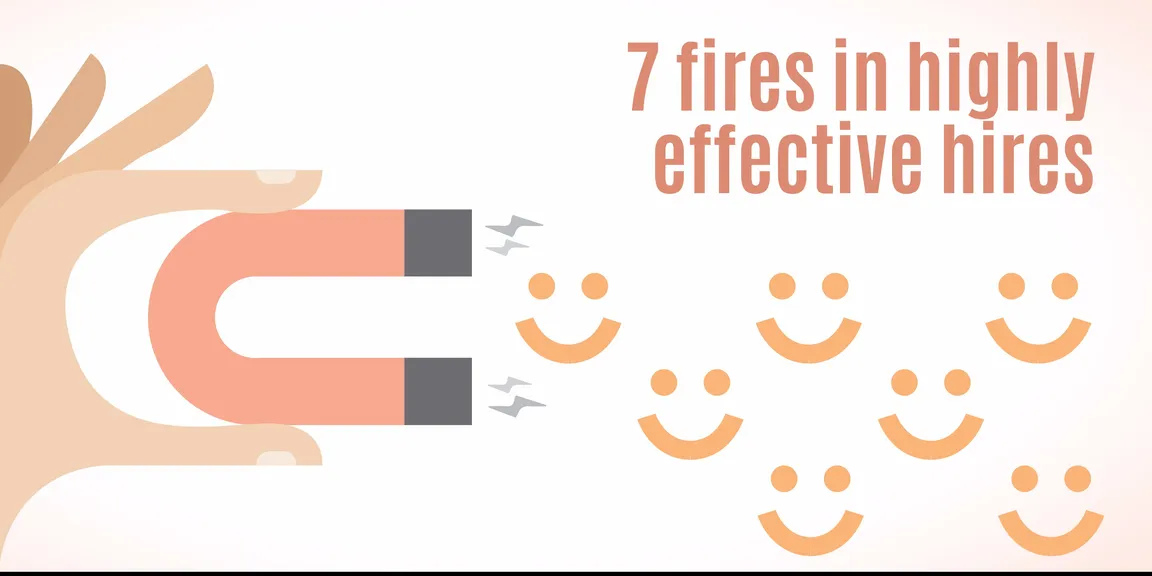

The Uninterviewed: 7 fires in highly effective hires
Off the beaten track questions to use during interviews. When hiring, how does one assess for attitude of candidates along with some practical tips on hiring good talent.

If Vilfredo Pareto was alive and was asked to stand up every time someone said ’80:20’ or ‘Pareto principle applies here’, he would be a horse for having to stand his entire life! The Pareto principle applies to most aspects of our personal and professional lives. It applies to hiring as well, in two very compelling ways. First, you can know 80% about a person through 20% of their characteristics. Second, put 20% of your entire professional effort into hiring and you will get 80% of your job done with relative ease.
In this blog, I will elaborate on the first aspect. I shall let you in on my internal compass I use to make hiring decisions.It is a compass because it is used to navigate through an interview. No fixed set of questions, just look for a bunch of characteristics that point to the fire in their bellies. What questions to ask and what goes next, depends on where and how deep one wants to dig.
The tests for domain skills, communication skills, integrity, compliance etc., the hygiene stuff have been assumed to have been done. This blog is all about ‘attitude’.
Several articles have been written on how important attitude is, so I am not going to delve on that. It does beg the question though, what makes for great attitude and how does one assess it? Let me see if I can help you with that.
Bid bye to the usual background
As an interviewer, you have the CV in front of you. You can read through the education, work experience, roles etc., etc., etc. Yet most of us begin by asking the candidate to repeat everything they have already put down on the CV. What a waste of time! Worse, the candidates usually repeat almost everything that’s already on their CV!
Even if the interviewer is being benign by asking about the candidate’s background, it is a chance for them to talk mostly about what’s NOT on the CV and a little bit about what is on it. If you get stuck with such a question, try to get the candidate to tell stories from their background. Talk about managers, successes, failures and about events that shaped their career. Avoid candidates who settle into “after that I moved to ABC company, where I held the position of project manager, I worked mostly on ERP projects and then it I moved to XYZ company” and instead, look for ”When I joined DEF, I was pleasantly surprised by their employee centric culture. They would go the extra mile. I loved working there and it brought out the best in me. I put in double shifts, stayed on top of my game and got promoted thrice. The one incident I still remember vividly is….”. You get the drift?
As an interviewer, try these questions:
What did you like most and like least about working at ABC?
If your CV were a story, what would it be? Which movie would it resemble?
What do you remember most from each of previous jobs?
And say hello to ‘thinking slow’
Baa baa black sheep, have you any wool?
NO! Buzz off!
That got your attention, didn’t it? Why? Because, it’s different from what we are used to. When we are made to do different, there is more to notice.
NO, I do not hire candidates that think slow. In fact, quite the opposite. It’s the other type of thinking slow, the one that Daniel Kahneman wrote about in his book ‘Thinking Fast and Slow’. If you were asked what’s two plus two, you won’t think much, but 27 multiplied by 23 will make you think.
Throwing unusual questions at candidates makes them crawl out of their comfort zone and ‘think slowly’. As the gears spin in their minds to churn out an answer, you get a sneak peek into the way they ideate. The ‘how’ of their thinking gives insights into the methods they will employ for problem solving when they are part of your team.
My favorite thinking slow question is “what do you do when you have nothing to do?” It’s short, it’s sweet, surprises most candidates and almost all of them repeat it before answering. If they like reading, ask what kind - fiction or non-fiction? Thrillers or drama? Why do they like thrillers? Etc., etc. You are really getting to know the person.
Here are some other questions you can try:
If all roles here are available to you with the same salary, which role will you pick and why?
If you were hiring for this position, what questions will you ask and how will you answer them?
Hard work beats talent when talent doesn’t work hard
It’s a famous quote by NBA star Kevin Durant and it’s true. Sustained success, good or bad, comes from hard work. It is an essential ingredient to succeed. Think of all famous personalities, celebrities, leaders, whether they be good or bad, you will find there is one common thread to bind them all and that thread is hard work. Whether it is Prime Minister Modi, former RBI Governor Raghuram Rajan, President Obama, Mahatma Gandhi, Dr. Martin Luther King, Nelson Mandela, Chhota Rajan, Kapil Sibal, Ram Jethmalani, each one of them is known for their hard work and their diligent work ethic.
In my 14 years at General Electric, the very cradle of corporate leadership, every leader at the top was a super hard worker. When you look around yourself and pick people who have enjoyed sustained success, 80% of them (Mr. Pareto, please stand up), if not all, will be hard workers.
What about smart work then? Well good, if you are smart worker. Won’t it be great if you are a smart worker AND a hard worker? I don’t hire people who are ONLY smart workers. Usually, these are the people who take short cuts to success and that kind of success doesn’t last.
Try these questions to assess the propensity for hard work:
When do you believe you have worked the hardest?
Do you like to ‘bite slightly more than you can chew’ or ‘more than you can chew’?
Are you a person who likes being busy or do you like to have some free time to take breaks?
Nothing succeeds like success but success cannot succeed without hard work.
Automatic or manual?
People who are self-driven are rarer than a rainbow. Think about your colleagues, your seniors or people on your team. Try to pick ones who do more than they have been asked to or do things that they have not been asked to. Are these people successful? Are they respected and liked by the team? Are they dependable? Almost always.
Self-driven people don’t need follow-ups and reviews. They are the “fill it, shut it, forget it” kinds. They shift through their gears as needed. It’s a rare quality but when you find it, don’t let it go. They are not only productive people themselves, they make you more productive! How do you assess this quality?
Difficult one this, but give these questions a try:
What extra-curricular activities do you participate in?
When do you think you should do other people’s job and when do you think you should not?
If you did the work of other people, will they not stop doing their work?
Are you singing your song or someone else’s?
Are you? Listen to 'Why you will fail to have a great career' to understand what I mean. If people are doing jobs that are very far away from what they are passionate about, then you will get sub-optimal results. Almost all self-help books tell you to find your passion and make that your work. Unfortunately, most of us have either realized it too late or are too afraid to take the leap. We have all, in a sense, compromised. The question is, how big is the compromise? Are you a painter who is writing code or are you a researcher working as an HR consultant. In the first case, the compromise is too big, while in the second the compromise is lesser. So, how do you find out what people are passionate about?
Well, ask them. You can do that directly or indirectly:
What are you really passionate about?
If you had all the money in the world, what would you love doing?
If all jobs in this company were made available to you, which one will you pick and why?
All of these and subsequent questions can help you understand the true passion of an individual. Hire those that have compromised the least!
Be 300
Have the balls (excuse me, ladies!) to take a stand. Balls of the size of Jupiter. 300 is a fantasy film about 300 Spartans defending their kingdom against an army of 100,000 Persians. Fiction it might be but there is lesson for all of us.
In one of my very first interviews, one where I was the candidate, I was asked “Is it possible to measure the benefits of all technology projects?”. My answer was in the affirmative. Boy oh boy, the way the interviewers went after me. Literally, a duel ensued. I stuck to my guns but the main interviewer was quite upset. He said, how do we measure the benefits of introducing an HR system or book-keeping system? I gave some answers but they were impractical ways to measure the benefits. For example, if you wanted to know how much value a CEO adds to the company, try this. Run without a CEO for 2-3 years and run another similar company with a CEO for 2-3 years. The difference will give you the value the CEO added. Theoretically yes, there is always a way but practically no, not always. That was my point but the interviewers were visibly upset with the lack of ‘practicality’ I had demonstrated. I left the interview dejected because I knew I wouldn’t get through.
Well, I got through. Not only did I get through but I was the only one to be selected from amongst 16 other candidates and best of all, I had not even been on the short list.
This attribute is easier to assess. Keep asking questions till you find the candidate taking a stand. Take the opposite stance and let the candidate fight it out. Whether or not the candidate wins or you win is immaterial. What’s important is that the candidate takes a stand and how well he/she maneuvers through it when presented with logical and rational challenges.
The card that trumps them all
After the US elections, the word trump has a new dimension to it. But for the sake of the world, oops, I meant for the sake of the word, we will stick to its original meaning from a game of cards. The trump card is the one that beats all other cards.
Taking feedback constructively, learning from it, changing oneself and adding new skills is an ability that trumps all other abilities. I will hire a candidate for this one ability even if he or she is lacking on some of the abilities we have talked about above.
If you can learn from your mistakes and learn new things along the way and are curious, you can do anything you want! Let me repeat that. If you have the ability to learn, you can be anything you want! There is no end to your success.
Do you know why? Let’s say you want the next promotion but you can’t get promoted because your communication skills need improvement. If you have the ability to learn, don’t you think you will be able to improve your communication skills? You bet you will be able to!
Let not the naysayers tell you otherwise. There are many who believe that people are born with communication skills or are born leaders and that these skills cannot be acquired. Partially true. Yes, one does need a basic minimum set of skills but that basic minimum is present in almost all of us. I am a living example of having learnt communication skills and leadership, neither of which I believe I was born with.
The other quality that goes hand in hand with learning is the ability to take feedback. The first step to learning is to know and become aware that there is a skill gap. More often than not, most of us fail to even acknowledge that we genuinely have “room to improve”. Once you get past that hurdle, learning will come easy. Try it.
How will you assess a person’s ability to learn, change and adapt?
Try this. After the interview, share your assessment with the candidate. In that assessment, be candid about what went well and what could have been better. I do that in nice, easy, calm tone that opens people up for acceptance. Here is what to watch out for. If the candidate acknowledges that these areas are indeed something he/she can improve upon do better, you have a clue.
Also, ask candidates when and how have they failed. What lessons did they learn? And my favorite one, how have you changed for the better over the years?
The long and short of it
Assessing attitude is not easy but it is not impossible either. Hire candidates that have the burning desire to learn, talk about experiences, solve problems your way, work hard, are self-driven, take a stand and have the fire to take on more than they can chew. If they have the attitude you’re looking for, hire them and write them into the next chapter of your company’s success!
The above characteristics are no guarantee for right hires. Sometimes you might get it spectacularly wrong. Most of the times though, say 80% of the time, you will get it right. Mr. Pareto, yet again, please stand up!
Acknowledgement
I thank Max Life Insurance for giving me the opportunity and empowering me to make hiring decisions on my own. I also thank Kanchan Gupta and Gopika Misra for inputs and help with the copy as well as Pink Lemonade for help with the graphic. Most importantly, I thank my team, my family, my managers and my employers, who I continue to learn from everyday.


